SARS-CoV-2-neutralising monoclonal antibodies to prevent COVID-19
- PMID: 35713300
- PMCID: PMC9205158
- DOI: 10.1002/14651858.CD014945.pub2
SARS-CoV-2-neutralising monoclonal antibodies to prevent COVID-19
Abstract
Background: Monoclonal antibodies (mAbs) are laboratory-produced molecules derived from the B cells of an infected host. They are being investigated as potential prophylaxis to prevent coronavirus disease 2019 (COVID-19).
Objectives: To assess the effects of SARS-CoV-2-neutralising mAbs, including mAb fragments, to prevent infection with SARS-CoV-2 causing COVID-19; and to maintain the currency of the evidence, using a living systematic review approach.
Search methods: We searched the Cochrane COVID-19 Study Register, MEDLINE, Embase, and three other databases on 27 April 2022. We checked references, searched citations, and contacted study authors to identify additional studies.
Selection criteria: We included randomised controlled trials (RCTs) that evaluated SARS-CoV-2-neutralising mAbs, including mAb fragments, alone or combined, versus an active comparator, placebo, or no intervention, for pre-exposure prophylaxis (PrEP) and postexposure prophylaxis (PEP) of COVID-19. We excluded studies of SARS-CoV-2-neutralising mAbs to treat COVID-19, as these are part of another review.
Data collection and analysis: Two review authors independently assessed search results, extracted data, and assessed risk of bias using Cochrane RoB 2. Prioritised outcomes were infection with SARS-CoV-2, development of clinical COVID-19 symptoms, all-cause mortality, admission to hospital, quality of life, adverse events (AEs), and serious adverse events (SAEs). We rated the certainty of evidence using GRADE.
Main results: We included four RCTs of 9749 participants who were previously uninfected and unvaccinated at baseline. Median age was 42 to 76 years. Around 20% to 77.5% of participants in the PrEP studies and 35% to 100% in the PEP studies had at least one risk factor for severe COVID-19. At baseline, 72.8% to 82.2% were SARS-CoV-2 antibody seronegative. We identified four ongoing studies, and two studies awaiting classification. Pre-exposure prophylaxis Tixagevimab/cilgavimab versus placebo One study evaluated tixagevimab/cilgavimab versus placebo in participants exposed to SARS-CoV-2 wild-type, Alpha, Beta, and Delta variant. About 39.3% of participants were censored for efficacy due to unblinding and 13.8% due to vaccination. Within six months, tixagevimab/cilgavimab probably decreases infection with SARS-CoV-2 (risk ratio (RR) 0.45, 95% confidence interval (CI) 0.29 to 0.70; 4685 participants; moderate-certainty evidence), decreases development of clinical COVID-19 symptoms (RR 0.18, 95% CI 0.09 to 0.35; 5172 participants; high-certainty evidence), and may decrease admission to hospital (RR 0.03, 95% CI 0 to 0.59; 5197 participants; low-certainty evidence). Tixagevimab/cilgavimab may result in little to no difference on mortality within six months, all-grade AEs, and SAEs (low-certainty evidence). Quality of life was not reported. Casirivimab/imdevimab versus placebo One study evaluated casirivimab/imdevimab versus placebo in participants who may have been exposed to SARS-CoV-2 wild-type, Alpha, and Delta variant. About 36.5% of participants opted for SARS-CoV-2 vaccination and had a mean of 66.1 days between last dose of intervention and vaccination. Within six months, casirivimab/imdevimab may decrease infection with SARS-CoV-2 (RR 0.01, 95% CI 0 to 0.14; 825 seronegative participants; low-certainty evidence) and may decrease development of clinical COVID-19 symptoms (RR 0.02, 95% CI 0 to 0.27; 969 participants; low-certainty evidence). We are uncertain whether casirivimab/imdevimab affects mortality regardless of the SARS-CoV-2 antibody serostatus. Casirivimab/imdevimab may increase all-grade AEs slightly (RR 1.14, 95% CI 0.98 to 1.31; 969 participants; low-certainty evidence). The evidence is very uncertain about the effects on grade 3 to 4 AEs and SAEs within six months. Admission to hospital and quality of life were not reported. Postexposure prophylaxis Bamlanivimab versus placebo One study evaluated bamlanivimab versus placebo in participants who may have been exposed to SARS-CoV-2 wild-type. Bamlanivimab probably decreases infection with SARS-CoV-2 versus placebo by day 29 (RR 0.76, 95% CI 0.59 to 0.98; 966 participants; moderate-certainty evidence), may result in little to no difference on all-cause mortality by day 60 (R 0.83, 95% CI 0.25 to 2.70; 966 participants; low-certainty evidence), may increase all-grade AEs by week eight (RR 1.12, 95% CI 0.86 to 1.46; 966 participants; low-certainty evidence), and may increase slightly SAEs (RR 1.46, 95% CI 0.73 to 2.91; 966 participants; low-certainty evidence). Development of clinical COVID-19 symptoms, admission to hospital within 30 days, and quality of life were not reported. Casirivimab/imdevimab versus placebo One study evaluated casirivimab/imdevimab versus placebo in participants who may have been exposed to SARS-CoV-2 wild-type, Alpha, and potentially, but less likely to Delta variant. Within 30 days, casirivimab/imdevimab decreases infection with SARS-CoV-2 (RR 0.34, 95% CI 0.23 to 0.48; 1505 participants; high-certainty evidence), development of clinical COVID-19 symptoms (broad-term definition) (RR 0.19, 95% CI 0.10 to 0.35; 1505 participants; high-certainty evidence), may result in little to no difference on mortality (RR 3.00, 95% CI 0.12 to 73.43; 1505 participants; low-certainty evidence), and may result in little to no difference in admission to hospital. Casirivimab/imdevimab may slightly decrease grade 3 to 4 AEs (RR 0.50, 95% CI 0.24 to 1.02; 2617 participants; low-certainty evidence), decreases all-grade AEs (RR 0.70, 95% CI 0.61 to 0.80; 2617 participants; high-certainty evidence), and may result in little to no difference on SAEs in participants regardless of SARS-CoV-2 antibody serostatus. Quality of life was not reported.
Authors' conclusions: For PrEP, there is a decrease in development of clinical COVID-19 symptoms (high certainty), infection with SARS-CoV-2 (moderate certainty), and admission to hospital (low certainty) with tixagevimab/cilgavimab. There is low certainty of a decrease in infection with SARS-CoV-2, and development of clinical COVID-19 symptoms; and a higher rate for all-grade AEs with casirivimab/imdevimab. For PEP, there is moderate certainty of a decrease in infection with SARS-CoV-2 and low certainty for a higher rate for all-grade AEs with bamlanivimab. There is high certainty of a decrease in infection with SARS-CoV-2, development of clinical COVID-19 symptoms, and a higher rate for all-grade AEs with casirivimab/imdevimab. Although there is high-to-moderate certainty evidence for some outcomes, it is insufficient to draw meaningful conclusions. These findings only apply to people unvaccinated against COVID-19. They are only applicable to the variants prevailing during the study and not other variants (e.g. Omicron). In vitro, tixagevimab/cilgavimab is effective against Omicron, but there are no clinical data. Bamlanivimab and casirivimab/imdevimab are ineffective against Omicron in vitro. Further studies are needed and publication of four ongoing studies may resolve the uncertainties.
Trial registration: ClinicalTrials.gov NCT04497987 NCT04519437 NCT04452318 NCT04625725 NCT04518410 NCT04501978 NCT04427501 NCT04634409 NCT04545060 NCT04602000 NCT04593641 NCT04411628 NCT04426695 NCT04666441 NCT04931238 NCT04790786 NCT04381936 NCT04425629 NCT04333732 NCT04894474 NCT04625972 NCT04859517 NCT05142527 NCT05184062.
Copyright © 2022 The Cochrane Collaboration. Published by John Wiley & Sons, Ltd.
Conflict of interest statement
CH: is Managing Editor at Cochrane Haematology.
YSP: is a member of staff at Cochrane Haematology.
VP: is former Managing Editor at Cochrane Haematology.
KLC: none.
LJE: is a consultant haematologist for NHS Blood and Transplant (received funds or grants) and Co‐ordinating Editor of Cochrane Haematology.
SS: I have participated in a study funded by the Federal Ministry of Education and Research, Germany (NaFoUniMedCovid19, funding number: 01KX2021; part of the project "COVIM" on kinetics and correlates of the neutralising antibody response to SARS‐CoV‐2 infection in humans. (DOI:10.1016/j.chom.2021.04.015)). In this review, I was not involved in risk of bias assessment, data extraction, or interpretation, but served as content expert.
IM: is Information Specialist at Cochrane Haematology.
EMW: none.
CS‐O: has declared to be employed by the not‐for‐profit Sanquin Blood Bank; the Blood Bank provides the plasma as raw material for the production of hyperIG by another division of Sanquin named Prothya.
ZM: is a haematologist at Monash University.
CDS: reports grants and personal fees from AstraZeneca, Janssen‐Cilag, MSD, and ViiV Healthcare; grants from Cepheid; grants, personal fees, and non‐financial support from Gilead Sciences; other from Apeiron and Eli Lilly; personal fees and non‐financial support from BBraun Melsungen; personal fees from AbbVie, BioNtech, Eli Lilly, Formycon, GSK, Molecular partners, MSD; Roche; SOBI during the conduct of the study, and Synairgen, outside the submitted work.
JJM: is an independent contractor for Atriva Therapeutics GMBH (received funds) and Gilead Sciences (received funds and travel).
MS: is an Infectious Diseases specialist at Charité University Hospital Berlin, Germany.
NS: none known; she is Co‐ordinating Editor of Cochrane Haematology, but was not involved in the editorial process for this review.
NK: is a member of staff at Cochrane Haematology.
The authors CH, YSP, VP, LJE, NS, and NK are affiliated with Cochrane Haematology but are not otherwise involved with the editorial process.
Figures

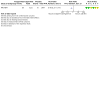

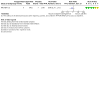
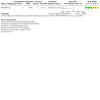
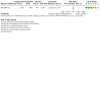
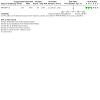


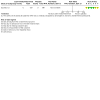
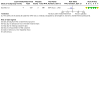
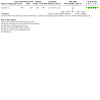
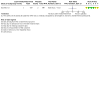
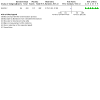
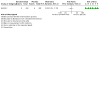
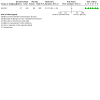

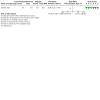
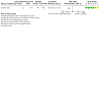
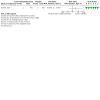
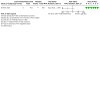
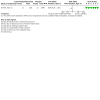
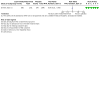

Update of
References
References to studies included in this review
BLAZE‐2 {published data only}
-
- Cohen MS, Nirula A, Mulligan M, Novak R, Marovich M, Stemer A, et al. Bamlanivimab prevents COVID-19 morbidity and mortality in nursing-home setting, 2021. www.croiconference.org/abstract/bamlanivimab-prevents-covid-19-morbidity... (accessed 1 June 2022).
-
- Cohen MS, Nirula A, Mulligan MJ, Novak RM, Marovich M, Yen C, et al. Effect of bamlanivimab vs placebo on incidence of COVID-19 among residents and staff of skilled nursing and assisted living facilities: a randomized clinical trial. JAMA 2021;326(1):46-55. [DOI: 10.1001/jama.2021.8828] - DOI - PMC - PubMed
Isa 2021 {published data only}
O'Brien 2021 {published data only}
-
- Hassan H, Turner K, Davis J, Ganguly S, Irvin S, Partridge M, et al. P-071: pharmacokinetics and immunogenicity assessment of a single subcutaneous dose of casirivimab and imdevimab in household contacts of SARS-CoV-2 infected persons. American Society for Clinical Pharmacology and Therapeutics 111;-:S5-S80. [DOI: 10.1002/cpt.2521] - DOI
-
- O'Brien M, Forleo-Neto E, Chen KC, Isa F, Heimann I, Sarkar N, et al. Casirivimab with imdevimab antibody cocktail for COVID-19 prevention: interim results, 2021. www.croiconference.org/abstract/casirivimab-with-imdevimab-antibody-cock... (accessed 1 June 2022):abstract no. 123.
-
- O'Brien M, Forleo-Neto E, Musser B, Isa F, Chan KC, Sarkar N, et al. Subcutaneous REGEN-COV antibody combination for Covid-19 prevention. medRxiv [Preprint] 2021. [DOI: 10.1101/2021.06.14.21258567] - DOI
-
- O'Brien M, Forleo-Neto E, Musser BJ, Isa F, Chan KC, Sarkar N, et al. COVID-19 prevention with subcutaneous administration of the monoclonal antibodies casirivimab and imdevimab: subgroup analysis in participants with cardiovascular disease and diabetes. American Heart Journal 2021;242:172-173, abstract no. 099. [DOI: 10.1016/j.ahj.2021.10.067] - DOI
-
- O'Brien M, Forleo-Neto E, Sarkar N, Isa F, Hou P, Chan KC, et al. Subcutaneous REGEN-COV antibody combination in early SARS-CoV-2 infection. medRxiv [Preprint] 2021. [DOI: 10.1101/2021.06.14.21258569] - DOI
PROVENT {published data only}
-
- Levin MJ, Ustianowski A, De Wit S, Launay O, Avila M, Seegobin S, et al. LB5. PROVENT: Phase 3 study of efficacy and safety of AZD7442 (tixagevimab/cilgavimab) for pre-exposure prophylaxis of COVID-19 in adults. Open Forum Infectious Diseases 2021;8(Suppl 1):S810. [DOI: 10.1093/ofid/ofab466.1646] - DOI
References to studies excluded from this review
ACTIV‐2 {published data only}
-
- Chew KW, Moser C, Daar ES, Wohl DA, Li JZ, Coombs R, et al. Bamlanivimab reduces nasopharyngeal SARS-CoV-2 RNA levels but not symptom duration in non-hospitalized adults with COVID-19. medrxiv [Preprint] 2021. [DOI: 10.1101/2021.12.17.21268009] - DOI
-
- Evering TH, Giganti M, Chew KW, Hughes M, Moser C, Wohl DA, et al. LB2. Safety and efficacy of combination SARS-CoV-2 monoclonal neutralizing antibodies (mAb) BRII-196 and BRII-198 in non-hospitalized COVID-19 patients. Open Forum Infectious Diseases 2021;8:S807-8. [DOI: ]
-
- Evering TH, Giganti M, Chew KW, Hughes M, Moser C, Wohl DA, et al. LB2. Safety and efficacy of combination SARS-CoV-2 monoclonal neutralizing antibodies (mAb) BRII-196 and BRII-198 in non-hospitalized COVID-19 patients. Open Forum Infectious Diseases 2021;8:S807-8. [DOI: 10.1093/ofid/ofab466.1643] - DOI
-
- Evering TH, Sanusi B, Jilg N, Yeh E, Moser C, Ritz J, et al. ABSTRACT O01. Prevalence and characteristics of post-acute sequelae of SARS-CoV-2 (PASC) in non-hospitalized persons with COVID-19 enrolled in a clinical trial of early treatment (ACTIV-2). Antiviral Therapy 2021;-:1-51. [DOI: 10.1177/13596535211063242] - DOI
ACTIV‐3 {published data only}
-
- ACTIV-3/Therapeutics for Inpatients with COVID-19 (TICO) Study Group. Efficacy and safety of two neutralising monoclonal antibody therapies, sotrovimab and BRII-196 plus BRII-198, for adults hospitalised with COVID-19 (TICO): a randomised controlled trial. Lancet Infectious Diseases 2022;22:622-35. [DOI: 10.1016/ S1473-3099(21)00751-9] - PMC - PubMed
-
- ACTIV-3/Therapeutics for Inpatients with COVID-19 (TICO) Study Group. Responses to a neutralizing monoclonal antibody for hospitalized patients with COVID-19 according to baseline antibody and antigen levels: a randomized controlled trial. Annals of Internal Medicine 2022;175:234-43. [DOI: 10.7326/M21-3507] - DOI - PMC - PubMed
BLAZE‐1 {published data only}
-
- Dougan M, Azizad M, Mocherla B, Gottlieb RL, Chen P, Hebert C, et al. A randomized, placebo-controlled clinical trial of bamlanivimab and etesevimab together in high-risk ambulatory patients with COVID-19 and validation of the prognostic value of persistently high viral load. Clinical Infectious Diseases 2021 Oct 28 [Epub ahead of print]. [DOI: 10.1093/cid/ciab912] - DOI - PMC - PubMed
-
- Dougan M, Nirula A, Gottlieb RL, Azizad M, Mocherla B, Chen P, et al. Bamlanivimab + etesevimab for treatment of COVID-19 in high-risk ambulatory patients. Topics in Antiviral Medicine 2021;29(1):33, abstract no. 122.
-
- Gottlieb RL, Nirula A, Chen P, Boscia J, Heller B, Morris J, et al. Effect of bamlanivimab as monotherapy or in combination with etesevimab on viral load in patients with mild to moderate COVID-19: a randomized clinical trial. JAMA 2021;325(7):632-44. [DOI: 10.1001/jama.2021.0202] - DOI - PMC - PubMed
BLAZE‐4 {published data only}
-
- Dougan M, Azizad M, Chen P, Feldman B, Frieman M, Igbinadolor A, et al. Bebtelovimab, alone or together with bamlanivimab and etesevimab, as a broadly neutralizing monoclonal antibody treatment for mild to moderate, ambulatory COVID-19. medrxiv [Preprint] 2022. [DOI: 10.1101/2022.03.10.22272100] - DOI
COMET‐ICE {published data only}
-
- Gupta A, Gonzalez-Rojas Y, Juarez E, Crespo Casal M, Moya J, Falci DR, et al. Effect of the neutralizing SARS-CoV-2 antibody sotrovimab in preventing progression of COVID-19: a randomized clinical trial. medRxiv [Preprint] 2021. [DOI: 10.1101/2021.11.03.21265533] - DOI
-
- Gupta AK, Rojas YG, Juarez E, Casal MC, Moya J, Falci DR, et al. 502. Early COVID-19 treatment with SARS-CoV-2 neutralizing antibody sotrovimab. Open Forum Infectious Diseases 2021;8:S353-4. [DOI: 10.1093/ofid/ofab466.701] - DOI
Eom 2021 {published data only}
-
- Eom JS, Ison M, Streinu-Cercel A, Săndulescu O, Preotescu LL, Kim YS, et al. Efficacy and safety of CT-P59 plus standard of care: a phase 2/3 randomized, double-blind, placebo-controlled trial in outpatients with mild-to-moderate SARS-CoV-2 infection [Preprint]. researchsquare.com/article/rs-296518/v1 (accessed 1 June 2022). [DOI: 10.21203/rs.3.rs-296518/v1] - DOI
-
- Ison MG, Kim JY, Sandulescu O, Preotescu LL, Rivera Martinez NE, Dobryanska M, et al. Therapeutic effect of regdanvimab in patients with mild to moderate COVID-19: day 28 results from a multicentre, randomised, controlled pivotal trial. Open Forum Infectious Diseases 2021;8:S375. [DOI: 10.1093/ofid/ofab466.745] - DOI
-
- Streinu-Cercel A, Săndulescu O, Preotescu LL, Kim JY, Kim YS, Cheon S, et al. Efficacy and safety of regdanvimab (CT-P59): a phase 2/3 randomized, double-blind, placebo-controlled trial in outpatients with mild-to-moderate coronavirus disease 2019. Open Forum Infectious Diseases 2022;9:ofac053. [DOI: 10.1093/ofid/ofac053] - DOI - PMC - PubMed
Kim 2021 {published data only}
-
- Kim JY, Jang YR, Hong JH, Jung JG, Park J-H, Streinu-Cercel A, et al. Safety, virologic efficacy, and pharmacokinetics of CT-P59, a neutralizing monoclonal antibody against SARS-CoV-2 spike receptor-binding protein: two randomized, placebo-controlled, phase I studies in healthy individuals and patients with mild SARS-CoV-2 infection. Clinical Therapeutics 2021;43(10):1706-27. [DOI: 10.1016/j.clinthera.2021.08.009] - DOI - PMC - PubMed
NCT04411628 {published data only}
-
- Sims JT, Poorbaugh J, Chang CY, Holzer T, Zhang L, Engle SM, et al. Relationship between gene expression patterns from nasopharyngeal swabs and serum biomarkers in patients hospitalized with COVID-19, following treatment with the neutralizing monoclonal antibody bamlanivimab. Journal of Translational Medicine 2022;20(1):134. [DOI: 10.1186/s12967-022-03345-3] - DOI - PMC - PubMed
NCT04426695 {published data only}
-
- Mylonakis E, Somersan-Karakaya S, Sivapalasingam S, Ali S, Sun Y, Bhore R, et al. LB4. Casirivimab and imdevimab for treatment of hospitalized patients with COVID-19 receiving low flow or no supplemental oxygen. Open Forum Infectious Diseases 2021;8:S809-10. [DOI: ]
-
- Somersan-Karakaya S, Mylonakis E, Menon VP, Wells JC, Ali S, Sivapalasingam S, et al. REGEN-COV® for treatment of hospitalized patients with Covid-19. medRxiv [Preprint] 2021. [DOI: 10.1101/2021.11.05.21265656] - DOI
-
- Turner K, Davis J, Ganguly H, Hassan H, Irvin S, Partridge M. P-182. Pharmacokinetics and pharmacodynamics of casirivimab and imdevimab in hospitalized patients with COVID-19. American Society for Clinical Pharmacology and Therapeutics 2022;111:S5-80. [DOI: 10.1002/cpt.2521] - DOI
NCT04666441 {published data only}
-
- Davis J, Turner K, Ganguly S, Hassan H, Irvin S, Partridge M, et al. P-049. Pharmacokinetics and pharmacodynamics of casirivimab and imdevimab in a dose-ranging study in outpatients with COVID-19. American Society for Clinical Pharmacology and Therapeutics 2022;111:S5-80. [DOI: 10.1002/cpt.2521] - DOI
-
- Portal-Celhay C, Forleo-Neto E, Eagan W, Musser BJ, Davis JD, Turner KC, et al. Phase 2 dose-ranging study of the virologic efficacy and safety of the combination COVID-19 antibodies casirivimab and imdevimab in the outpatient setting. medRxiv [Preprint] 2021. [DOI: 10.1101/2021.11.09.21265912] - DOI
NCT04931238 {published data only}
-
- Dong R, Jiang L, Yang T, Wang C, Zhang Y, Chen X, et al. Efficacy and safety of SARS-CoV-2 neutralizing antibody JS016 in hospitalized Chinese patients with COVID-19: a phase 2/3, multicenter, randomized, open-label, controlled trial. Antimicrobial Chemotherapy 2022;66(3):e02045-21. [DOI: 10.1128/aac.02045-21] - DOI - PMC - PubMed
OPTIMISE‐C19 {published data only}
-
- Huang ST, McCreary EK, Bariola JR, Minnier TE, Wadas RJ, Shovel JA, et al. Effectiveness of casirivimab and imdevimab, and sotrovimab during Delta variant surge: a prospective cohort study and comparative effectiveness randomized trial. medRxiv [Preprint] 2021. [DOI: 10.1101/2021.12.23.21268244] - DOI - PMC - PubMed
-
- Huang T, McCreary EK, Bariola JR, Wadas RJ, Kip KE, Marroquin OC, et al. The UPMC OPTIMISE-C19 (OPtimizing Treatment and Impact of Monoclonal antIbodieS through Evaluation for COVID-19) trial: a structured summary of a study protocol for an open-label, pragmatic, comparative effectiveness platform trial with response-adaptive randomization. Trials 2021;22:363. [DOI: 10.1186/s13063-021-05316-3] - DOI - PMC - PubMed
-
- McCreary EK, Bariola JR, Minnier T, Wadas RJ, Shovel JA, Albin D, et al. A learning health system randomized trial of monoclonal antibodies for Covid-19. medRxiv [Preprint] 2021. [DOI: 10.1101/2021.09.03.21262551] - DOI
RECOVERY {published data only}
-
- Horby PW, Mafham M, Peto L, Campbell M, Pessoa-Amorim G, Spata E, et al. Casirivimab and imdevimab in patients admitted to hospital with COVID-19 (RECOVERY): a randomised, controlled, open-label, platform trial. medRxiv [Preprint] 2021. [DOI: 10.1101/2021.06.15.21258542] - DOI
Weinreich {published data only}
-
- Ganguly S, Turner K, Davis J, Hassan H, Irvin S, Partridge M, et al. P-061. Pharmacokinetics and pharmacodynamics of casirivimab and imdevimab in outpatients with COVID-19. American Society for Clinical Pharmacology and Therapeutics 2022;111:S5-80. [DOI: 10.1002/cpt.2521] - DOI
-
- Weinreich DM, Sivapalasingam S, Norton T, Ali S, Gao H, Bhore R, et al. REGEN-COV antibody cocktail clinical outcomes study in COVID-19 outpatients. medRxiv [Preprint]. [DOI: 10.1101/2021.05.19.21257469] - DOI
-
- Weinreich DM, Sivapalasingam S, Norton T, Ali S, Gao H, Bhore R, et al. REGEN-COV antibody cocktail in outpatients with COVID-19. medRxiv [Preprint] 2021. [DOI: 10.1101/2021.06.09.21257915] - DOI
References to studies awaiting assessment
CROWN CORONATION {published data only}EUCTR2020‐001402‐38‐GBISRCTN99916292PACTR202101794986980
-
- NCT04333732. CROWN CORONATION: COVID-19 research outcomes worldwide network for CORONAvirus prevenTION (CROWN CORONA). clinicaltrials.gov/ct2/show/NCT04333732 (first received 3 April 2020).
NCT04894474 {published data only}
-
- NCT04894474. A study to test whether BI 767551 can prevent COVID-19 in people who have been exposed to SARS-CoV-2. clinicaltrials.gov/ct2/show/NCT04894474 (first received 20 May 2021).
References to ongoing studies
NCT04625972 {published data only}
-
- NCT04625972. Phase III double-blind, placebo-controlled study of AZD7442 for post-exposure prophylaxis of COVID-19 in adults (STORM CHASER). clinicaltrials.gov/ct2/show/record/NCT04625972 (first received 12 November 2020).
NCT04859517 {published data only}
-
- NCT04859517. Evaluation of ADG20 for the prevention of COVID-19 (EVADE). clinicaltrials.gov/ct2/show/record/NCT04859517 (first received 26 April 2021).
NCT05142527 {published data only}
-
- NCT05142527. Study to evaluate the safety and efficacy of a monoclonal antibody cocktail for the prevention of COVID-19. clinicaltrials.gov/ct2/show/NCT05142527 (first received 2 December 2021).
NCT05184062 {published data only}
-
- NCT05184062. A study to evaluate the safety and tolerability of AZD7442 in Chinese adults. clinicaltrials.gov/ct2/show/NCT05184062 (first received 11 January 2022).
Additional references
Alsoussi 2020
Andabaka 2013
Andrews 2022
AstraZeneca 2020
-
- AstraZeneca. AstraZeneca's COVID-19 vaccine authorised for emergency supply in the UK. www.astrazeneca.com/media-centre/press-releases/2020/astrazenecas-covid-... (accessed 12 January 2021).
Baum 2020a
Baum 2020b
Bayer 2019
Boulware 2020
Bruel 2022
-
- Bruel T, Hadjadj J, Maes P, Planas D, Seve A, Staropoli I, et al. Serum neutralization of SARS-CoV-2 Omicron sublineages BA.1 and BA.2 in patients receiving monoclonal antibodies. Nature Medicine 2022 Mar 23 [Epub ahead of print]. - PubMed
Buitrago‐Garcia 2020
-
- Buitrago-Garcia D, Egli-Gany D, Counotte MJ, Hossmann S, Imeri H, Ipekci AM, et al. Occurrence and transmission potential of asymptomatic and presymptomatic SARS-CoV-2 infections: a living systematic review and meta-analysis. PLoS Medicine 2020;17(9):e1003346. [DOI: 10.1371/journal.pmed.1003346] - DOI - PMC - PubMed
CDC 2021a
-
- Centers for Disease Control and Prevention. COVIDView – a weekly surveillance summary of U.S. COVID-19 activity (Key updates for week 4). www.cdc.gov/coronavirus/2019-ncov/covid-data/covidview/index.html (accessed 8 December 2021).
CDC 2021b
-
- Centers for Disease Control and Prevention. Symptoms of COVID-19. www.cdc.gov/coronavirus/2019-ncov/symptoms-testing/symptoms.html (accessed 8 December 2021).
CDC 2021c
-
- Centers for Disease Control and Prevention. Interim clinical considerations for use of COVID-19 vaccines currently approved or authorized in the United States. www.cdc.gov/vaccines/covid-19/clinical-considerations/covid-19-vaccines-... (accessed 8 December 2021).
Chen 2020
COMET 2020
-
- Core Outcome Measures in Effectiveness Trials (COMET). Core outcome set developers’ response to COVID-19. www.comet-initiative.org/Studies/Details/1538 (accessed 9 February 2021).
Copin 2021
Covidence [Computer program]
-
- Veritas Health Innovation Covidence. Melbourne, Australia: Veritas Health Innovation, accessed after 21 December 2020. Available at covidence.org.
Custódio 2020
Deeks 2021
-
- Deeks JJ, Higgins JP, Altman DG. Chapter 10: Analysing data and undertaking meta-analyses. In: Higgins JP, Thomas J, Chandler J, Cumpston M, Li T, Page MJ, et al, editor(s). Cochrane Handbook for Systematic Reviews of Interventions Version 6.2 (updated February 2021). Cochrane, 2021. Available from training.cochrane.org/handbook/archive/v6.2.
de la Rica 2020
Di Fusco 2021
Driggin 2020
-
- Driggin E, Madhavan Mahesh V, Bikdeli B, Chuich T, Laracy J, Biondi-Zoccai G, et al. Cardiovascular considerations for patients, health care workers, and health systems during the COVID-19 pandemic. Journal of the American College of Cardiology 2020;75(18):2352-71. [DOI: 10.1016/j.jacc.2020.03.031] - DOI - PMC - PubMed
Eldridge 2021
-
- Eldridge S, Campbell M, Campbell M, Dahota A, Giraudeau B, Reeves B, et al. Revised Cochrane risk of bias tool for randomized trials (RoB 2.0). Additional considerations for cluster-randomized trials (RoB 2 CRT). www.riskofbias.info/welcome/rob-2-0-tool/rob-2-for-cluster-randomized-tr... 2021.
Endnote X9 [Computer program]
-
- EndNote X9. EndNote. Clarivate, 2013.
FDA 2020
-
- US Food and Drug Administration. COVID-19: developing drugs and biological products for treatment or prevention guidance for industry. www.fda.gov/media/137926/download (accessed 7 June 2022).
FDA 2021a
-
- US Food and Drug Administration. Emergency Use Authorization – Coronavirus Disease 2019 (COVID-19) EUA information. www.fda.gov/emergency-preparedness-and-response/mcm-legal-regulatory-and... (accessed 9 December 2021). - PubMed
FDA 2021b
-
- US Food and Drug Administration. Coronavirus (COVID-19) update: FDA authorizes new long-acting monoclonal antibodies for pre-exposure prevention of COVID-19 in certain individuals. www.fda.gov/news-events/press-announcements/coronavirus-covid-19-update-... (accessed 20 April 2022).
FDA 2021c
-
- US Food and Drug Administration. COVID-19 vaccines. www.fda.gov/emergency-preparedness-and-response/coronavirus-disease-2019... (accessed 12 January 2021).
FDA 2021d
-
- US Food and Drug Administration. Coronavirus (COVID-19) update: FDA authorizes first oral antiviral for treatment of COVID-19. www.fda.gov/news-events/press-announcements/coronavirus-covid-19-update-... (accessed 20 April 2022).
FDA 2021e
-
- US Food and Drug Administration. Coronavirus (COVID-19) update: FDA authorizes additional oral antiviral for treatment of COVID-19 in certain adults. www.fda.gov/news-events/press-announcements/coronavirus-covid-19-update-... (accessed 20 April 2022).
FDA 2021f
-
- US Food and Drug Administration. Coronavirus (COVID-19) update: FDA revokes Emergency Use Authorization for monoclonal antibody bamlanivimab. www.fda.gov/news-events/press-announcements/coronavirus-covid-19-update-... (accessed 20 April 2022).
FDA 2022a
-
- US Food and Drug Administration. Coronavirus (COVID-19) update: FDA limits use of certain monoclonal antibodies to treat COVID-19 due to the Omicron variant. www.fda.gov/news-events/press-announcements/coronavirus-covid-19-update-... (accessed 20 April 2022).
FDA 2022b
-
- US Food and Drug Administration. FDA updates Sotrovimab Emergency Use Authorization. www.fda.gov/drugs/drug-safety-and-availability/fda-updates-sotrovimab-em... (accessed 20 April 2022).
FDA 2022c
-
- US Food and Drug Administration. Coronavirus (COVID-19) update: FDA authorizes new monoclonal antibody for treatment of COVID-19 that retains activity against Omicron variant. www.fda.gov/news-events/press-announcements/coronavirus-covid-19-update-... (accessed 20 April 2022).
FDA 2022d
-
- US Food and Drug Administration. Coronavirus (COVID-19) update: FDA authorizes second booster dose of two COVID-19 vaccines for older and immunocompromised individuals. www.fda.gov/news-events/press-announcements/coronavirus-covid-19-update-... (accessed 20 April 2022).
Fung 2020
Gai 2021
Galmiche 2022
Glasgow 2020
Glaunsinger 2020
-
- Glaunsinger B. Lecture 2: "Coronavirus biology", from the course "COVID-19, SARS-CoV-2 and the pandemic" [video]. biology.mit.edu/undergraduate/current-students/subject-offerings/covid-1... (accessed 4 November 2020).
Goldberg 2021
Gottlieb 2021
-
- Gottlieb RL, Nirula A, Chen P, Boscia J, Heller B, Morris J, et al. Effect of bamlanivimab as monotherapy or in combination with etesevimab on viral load in patients with mild to moderate COVID-19: a randomized clinical trial. Journal of the American Medical Association 2021;327(7):632-44. [DOI: 10.1001/jama.2021.0202] - DOI - PMC - PubMed
GRADEpro GDT [Computer program]
-
- McMaster University (developed by Evidence Prime) GRADEpro GDT. Hamilton (ON): McMaster University (developed by Evidence Prime), 2020. Available at gradepro.org.
Hanke 2020
Hassan 2020
Higgins 2003
Higgins 2021a
-
- Higgins JP, Li T, Deeks JJ. Chapter 6: Choosing effect measures and computing estimates of effect. In: Higgins JP, Thomas J, Chandler J, Cumpston M, Li T, Page MJ, et al, editor(s). Cochrane Handbook for Systematic Reviews of Interventions Version 6.2 (updated February 2021). Cochrane, 2021. Available from training.cochrane.org/handbook/archive/v6.2.
Higgins 2021b
-
- Higgins JP, Eldridge S, Li T. Chapter 23: Including variants on randomized trials. In: Higgins JP, Thomas J, Chandler J, Cumpston M, Li T, Page MJ, et al, editor(s). Cochrane Handbook for Systematic Reviews of Interventions Version 6.2 (updated February 2021). Cochrane, 2021. Available from training.cochrane.org/handbook/archive/v6.2.
Higgins 2021c
-
- Higgins JP, Savović J, Page MJ, Elbers RG, Sterne JA. Chapter 8: Assessing risk of bias in a randomized trial. In: Higgins JP, Thomas J, Chandler J, Cumpston M, Li T, Page MJ, et al, editor(s). Cochrane Handbook for Systematic Reviews of Interventions Version 6.2 (updated February 2021). Cochrane, 2021. Available from training.cochrane.org/handbook/archive/v6.2.
Hoffmann 2020
Horby 2021
-
- Horby PW, Mafham M, Peto L, Campbell M, Pessoa-Amorim G, Spata E, et al. Casirivimab and imdevimab in patients admitted to hospital with COVID-19 (RECOVERY): a randomised, controlled, open-label, platform trial. medRxiv [Preprint] 2021. [DOI: 10.1101/2021.06.15.21258542] - DOI
Huang 2020
Iketani 2022
Jaworski 2021
Johns Hopkins 2021
-
- Mortality analysis. www.coronavirus.jhu.edu/data/mortality (accessed 11 March 2021).
Jovčevska 2020
Kaplon 2020
Kluge 2021
Krammer 2021
Kreuzberger 2021
Lauer 2020
Lee 2020
Lefebvre 2021
-
- Lefebvre C, Glanville J, Briscoe S, Littlewood A, Marshall C, Metzendorf M-I, et al. Chapter 4: Searching for and selecting studies. In: Higgins JP, Thomas J, Chandler J, Cumpston M, Li T, Page MJ, et al, editor(s). Cochrane Handbook for Systematic Reviews of Interventions Version 6.2 (updated February 2021). Cochrane, 2021. Available from training.cochrane.org/handbook/archive/v6.2.
Li 2021
-
- Li T, Higgins JP, Deeks JJ. Chapter 5: Collecting data. In: Higgins JP, Thomas J, Chandler J, Cumpston M, Li T, Page MJ, et al, editor(s). Cochrane Handbook for Systematic Reviews of Interventions Version 6.2 (updated February 2021). Cochrane, 2021. Available from training.cochrane.org/handbook/archive/v6.2.
Liang 2020
Living Evidence Network 2019
-
- Living Evidence Network. Guidance for the production and publication of Cochrane living systematic reviews: Cochrane Reviews in living mode, 2019. community.cochrane.org/review-production/production-resources/living-sys... (accessed 1 June 2022).
Lu 2020a
Lu 2020b
Lu 2021
Lundgren 2021
Mair 2022
Marovich 2020
Marshall 2020
Marston 2018
Microsoft Excel [Computer program]
-
- Microsoft Excel. Microsoft Corporation. Microsoft Corporation, 2018. office.microsoft.com/excel.
Moher 2009
Monin‐Aldama 2021
-
- Monin-Aldama L, Laing AG, Muñoz-Ruiz M, McKenzie DR, Molino del Barrio I, Alaguthurai T, et al. Interim results of the safety and immune-efficacy of 1 versus 2 doses of COVID-19 vaccine BNT162b2 for cancer patients in the context of the UK vaccine priority guidelines. medRxiv [Preprint] 2021. [DOI: 10.1101/2021.03.17.21253131] - DOI
Muik 2021
Mulangu 2019
National COVID‐19 Clinical Evidence Taskforce 2020
-
- National COVID-19 Clinical Evidence Taskforce. Caring for people with COVID-19: supporting Australia's healthcare professionals with continually updated, evidence-based clinical guidelines. covid19evidence.net.au/#living-guidelines (accessed 22 November 2021).
NCT04383548
-
- NCT04383548. Clinical study for efficacy of anti-corona VS2 immunoglobulins prepared from COVID19 convalescent plasma prepared by VIPS Mini-Pool IVIG medical devices in prevention of SARS-CoV-2 infection in high risk groups as well as treatment of early cases of COVID19 patients. clinicaltrials.gov/ct2/show/NCT04383548 (first received 12 May 2020).
NCT04425629
-
- NCT04425629. Safety, tolerability, and efficacy of anti-spike (S) SARS-CoV-2 monoclonal antibodies for the treatment of ambulatory adult and pediatric patients with COVID-19. clinicaltrials.gov/ct2/show/NCT04425629 (first received 11 June 2020).
NCT04427501
-
- NCT04427501. A randomized, double-blind, placebo-controlled, phase 2/3 study to evaluate the efficacy and safety of LY3819253 and LY3832479 in participants with mild to moderate COVID-19 illness. clinicaltrials.gov/ct2/show/NCT04427501 (first received 11 June 2020).
NCT04561063
-
- NCT04561063. COVID-19 Prophylaxis South Africa (COVER HCW) (COVER). clinicaltrials.gov/ct2/show/NCT04561063 (first received 23 September 2020). [NCT04561063]
NCT04836260
-
- NCT04836260. Preemptive use of convalescent plasma for high-risk patients with COVID-19. clinicaltrials.gov/ct2/show/NCT04836260 (first received 8 April 2021).
NCT05135650
-
- NCT05135650. Pharmacokinetics of sotrovimab as pre-exposure prophylaxis for COVID-19 in hematopoietic stem cell transplant recipients, COVIDMAB study. clinicaltrials.gov/ct2/show/NCT05135650 (first received 26 November 2021).
NCT05210101
-
- NCT05210101. A safety and tolerability study of sotrovimab (VIR-7831) prophylaxis against COVID-19 in immunocompromised individuals. clinicaltrials.gov/ct2/show/NCT05210101 (first received 27 January 2022).
NCT05216588
-
- NCT05216588. Pre-exposure prophylaxis of SARS-CoV-2 infection (COVID-19) by monoclonal antibodies with early access authorization in immunocompromised patients. A prospective cohort (PRECOVIM). clinicaltrials.gov/ct2/show/NCT05216588 (first received 31 January 2022).
NCT05234398
-
- NCT05234398. Tixagevimab/cilgavimab protection of Covid-19 in transplanted patients (TIXCI-TRANS). clinicaltrials.gov/ct2/show/NCT05234398 (first received 10 February 2022).
Nehal 2021
NIH 2022
-
- NIH COVID-19 treatment guidelines. Prevention of SARS-CoV-2 Infection. www.covid19treatmentguidelines.nih.gov/overview/prevention-of-sars-cov-2... (accessed 20 April 2022).
Ou 2020
Parmar 1998
Perry 2022
Review Manager Web 2021 [Computer program]
-
- The Cochrane Collaboration Review Manager Web (RevMan Web). Version 2.6.0. The Cochrane Collaboration, 2021. Available at revman.cochrane.org.
Rogers 2020
Rössler 2022
Santesso 2020
Schünemann 2021
-
- Schünemann HJ, Higgins JP, Vist GE, Glasziou P, Akl EA, Skoetz N, et al. Chapter 14: Completing 'Summary of findings' tables and grading the certainty of the evidence. In: Higgins JP, Thomas J, Chandler J, Cumpston M, Li T, Page MJ, et al, editor(s). Cochrane Handbook for Systematic Reviews of Interventions Version 6.2 (updated February 2021). Cochrane, 2021. Available from training.cochrane.org/handbook/archive/v6.2.
Siemieniuk 2020
Skoetz 2020
-
- Skoetz N, Goldkuhle M, Dalen EC, Akl EA, Trivella M, Mustafa RA, et al. GRADE guidelines 27: how to calculate absolute effects for time-to-event outcomes in summary of findings tables and Evidence Profiles. Journal of Clinical Epidemiology 2020;118:124-31. [DOI: 10.1016/j.jclinepi.2019.10.015] - DOI - PubMed
Sterne 2019
Struyf 2020
-
- Struyf T, Deeks JJ, Dinnes J, Takwoingi Y, Davenport C, Leeflang MM, et al. Signs and symptoms to determine if a patient presenting in primary care or hospital outpatient settings has COVID-19. Cochrane Database of Systematic Reviews 2020, Issue 7. Art. No: CD013665. [DOI: 10.1002/14651858.CD013665] - DOI - PMC - PubMed
Tada 2020
Takashita 2022
Tang 2021
The Antibody Society 2021
-
- The Antibody Society. www.antibodysociety.org/covid-19-biologics-tracker/ (accessed 8 December 2021).
Tierney 2007
Tolouian 2020
-
- Tolouian R, Vahed SZ, Ghiyasvand S, Tolouian A, Ardalan M. COVID-19 interactions with angiotensin-converting enzyme 2 (ACE2) and the kinin system; looking at a potential treatment. Journal of Renal Injury Prevention 2020;9(2):e19. [DOI: 10.34172/jrip.2020.19] - DOI
UNDP 2021
-
- United Nations Development Programme. Global dashboard for vaccine equity. data.undp.org/vaccine-equity/ (accessed 20 April 2022).
Vitiello 2022
Wang 2021
Weinreich 2021
WHO 2003
-
- World Health Organization. Cumulative number of reported probable cases of SARS. www.who.int/csr/sars/country/2003_07_11/en (accessed 8 February 2021).
WHO 2020a
-
- World Health Organization. Report of the WHO–China joint mission on coronavirus disease 2019 (COVID-19). www.who.int/docs/default-source/coronaviruse/who-china-joint-mission-on-... (accessed 1 June 2022).
WHO 2020b
-
- World Health Organization. World Health Organization Quality of Life assessment instrument (WHOQOL-100). www.who.int/tools/whoqol/whoqol-100 (accessed 5 May 2021).
WHO 2020c
WHO 2021a
-
- World Health Organization Eastern Mediterranean Regional Office. Middle East respiratory syndrome. www.emro.who.int/health-topics/mers-cov/mers-outbreaks.html (accessed 26 February 2021).
WHO 2021b
-
- World Health Organization. WHO Coronavirus Disease (COVID-19) Dashboard. covid19.who.int (accessed 8 February 2021).
WHO 2021c
-
- World Health Organization. Weekly epidemiological update – 27 January 2021. www.who.int/publications/m/item/weekly-epidemiological-update-27-january... (accessed 7 February 2021).
WHO 2021d
-
- World Health Organization. Tracking SARS-CoV-2 variants. www.who.int/en/activities/tracking-SARS-CoV-2-variants/ (accessed 9 December 2021).
WHO 2021e
-
- World Health Organisation. WHO validates Sinovac COVID-19 vaccine for emergency use and issues interim policy recommendations. www.who.int/news/item/01-06-2021-who-validates-sinovac-covid-19-vaccine-... (accessed 17 November 2021).
WHO 2022
-
- World Health Organization. Statement on Omicron sublineage BA.2. www.who.int/news/item/22-02-2022-statement-on-omicron-sublineage-ba.2 (accessed 20 April 2022).
Widera 2021
-
- Widera M, Wilhelm A, Hoehl S, Pallas C, Kohmer N, Wolf T, et al. Bamlanivimab does not neutralize two SARS-CoV-2 variants carrying E484K in vitro. medRxiv [Preprint]. [DOI: 10.1101/2021.02.24.21252372] - DOI
Wise 2022
Wrapp 2020
Wu 2020
-
- Wu Z, McGoogan JM. Characteristics of and important lessons from the coronavirus disease 2019 (COVID-19) outbreak in China: summary of a report of 72 314 cases from the Chinese Center for Disease Control and Prevention. Journal of the American Medical Association 2020;323(13):1239-42. [DOI: 10.1001/jama.2020.2648] - DOI - PubMed
Yang 2020
References to other published versions of this review
Publication types
MeSH terms
Substances
Supplementary concepts
Associated data
LinkOut - more resources
Full Text Sources
Other Literature Sources
Medical
Miscellaneous

